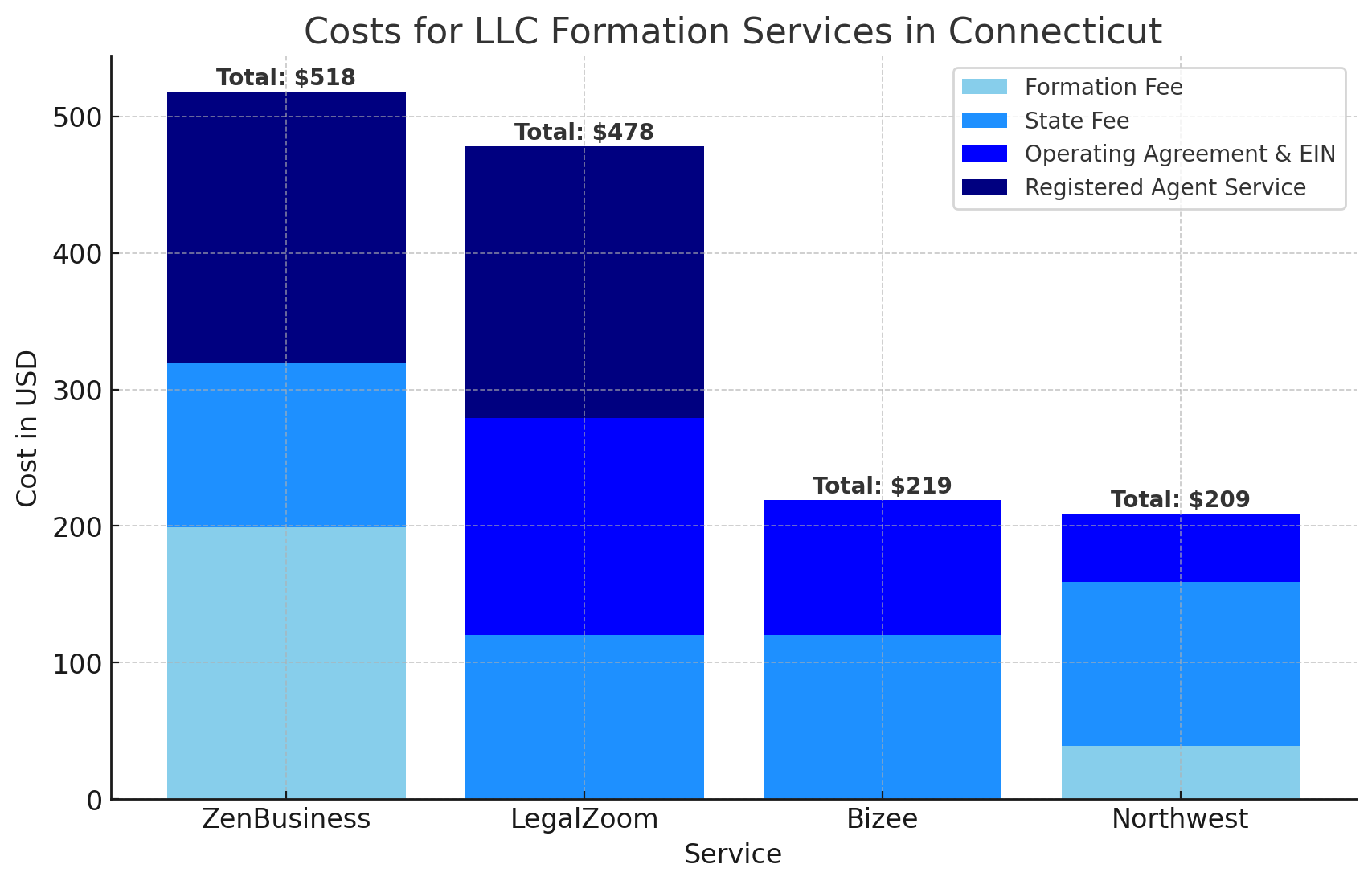Starting a Limited Liability Company (LLC) in Connecticut is an excellent choice for entrepreneurs looking to establish a solid foundation for their business. This article offers a step-by-step guide to smoothly navigate the process of forming an LLC in Connecticut. Designed to be accessible and informative, it caters to both new and experienced entrepreneurs.
Options for Forming an LLC in Connecticut
- Do-It-Yourself (DIY): Suitable for those who are comfortable with legal processes and prefer to manage things on their own.
Go to the Connecticut Secretary of State’s website to set up the LLC and then to the IRS’s website to get your EIN (Employer Identification Number). - Hiring a Lawyer: Recommended for complex cases and tailored legal advice.
- Using a Formation Service: Companies like Bizee, ZenBusiness, LegalZoom, and our recommended choice, Northwest Registered Agent, offer efficient and affordable services.

Steps to Form an LLC in Connecticut
- Choose Your LLC’s Name: The name must be unique in Connecticut and include “Limited Liability Company” or its abbreviations.
Adherence to Connecticut’s naming guidelines is crucial and they are listed in CT Gen Stat § 34-243k. - Designate a Registered Agent: A registered agent with a physical address in Connecticut is mandatory to handle your LLC's legal documents.
- File the Certificate of Organization: This essential document is submitted to the Connecticut Secretary of State. It includes details like your LLC’s name, address, and management structure. The filing fee is $120.
- Draft an Operating Agreement: Although not legally required in Connecticut, this document is vital for outlining your LLC's operational and management structures.
- Obtain an Employer Identification Number (EIN): Essential for tax and employment purposes, available from the IRS website.
- Open a Business Bank Account: Separate your personal and business finances by setting up a dedicated bank account for your LLC.
- Fund Your LLC: Capitalize your business through personal investments, loans, or other financing options.
- Ongoing Compliance: Ensure to file an Annual Report and maintain your LLC's good standing in Connecticut.
Establishing Your LLC with Northwest Registered Agent
Form your LLC in Connecticut with ease using Northwest Registered Agent.
By clicking on the button below, you can use our affiliate link
and form your LLC in Connecticut for only $39, plus state fees. This exclusive offer includes their registered agent service free for the first year, adding extra value and savings for your new venture.
We get commissions for purchases made through links in this post.
Legal Considerations and Compliance in Connecticut
Adhere to Connecticut-specific regulations, such as maintaining a registered agent and filing Annual Reports to keep your LLC compliant.
Benefits of Forming an LLC in Connecticut
LLCs in Connecticut provide limited liability protection, tax advantages, and operational flexibility, in a state known for its supportive business environment.
Common Mistakes to Avoid
Stay vigilant about legal obligations and avoid commingling personal and business finances. Use professional services when necessary.
Next Steps After Establishing Your LLC
Focus on developing a solid business plan, setting up accounting systems, and marketing your products or services.
Conclusion
Choosing to form an LLC in Connecticut can be a strategic decision for entrepreneurs. Whether opting for DIY, legal assistance, or a formation service like Northwest Registered Agent, it’s important to understand and follow the necessary steps to ensure proper setup and compliance.
Start an LLC in Connecticut FAQs
Can you be your own registered agent in Connecticut?
Yes, but if you act as your own registered agent in Connecticut, your name and address will be publicly listed. You'll need to be available during regular business hours to receive any legal documents in person.
Can I change my registered agent after I start an LLC?
Yes. To change your registered agent in Connecticut, use this link. You will need to file a Change of Agent form with the Secretary of State’s office. There is a $50 filing fee.
What’s the difference between a member-managed and manager-managed LLC?
If you go for a member-managed LLC, the members (owners) will handle the day-to-day operations. In a manager-managed LLC, members hire managers to run things. These managers take care of tasks such as hiring and firing employees, managing credit and bank accounts, and signing agreements and contracts.
What should be included in an operating agreement?
A personalized operating agreement addresses both the day-to-day and overarching aspects of your company, encompassing everything from member responsibilities to the dissolution of the business. Here are common topics typically included in operating agreements:
- Initial investments
- Profits, losses, and distributions
- Voting rights, decision-making powers, and management
- Transfer of membership interest
- Dissolving the business
Do I need an EIN for my Connecticut LLC?
Yes, you need an EIN if your business has employees, is a multi-member LLC, or is taxed as a corporation. Even if your LLC isn't legally obligated to have an EIN, it's advisable. An EIN allows you to open bank accounts, apply for business licenses, and is generally essential for business operations. It also helps keep your Social Security Number (SSN) private during business transactions.